Greetings
Friends in the Name of Safety:
Safety Section UPDATE: By now, most
of you have probably been made aware of the
Legislative
Mandated Fee Schedule that will take
effect December 1, 2009. Early feedback has
been very positive and we look forward to
continuing to serve you with your safety
training needs. Please give us a call to
schedule your safety training classes early.
Thanks again for your continued support!
New N.C. Industrial Commission Web Page:
We have a new look! Please visit our
brand new Web Page. To checkout the Safety
Education Page... View and Save as as
FAVORITE by
CLICKING HERE
Be on the lookout for new programs soon!
80th Statewide Safety
Conference!
Mark your calendar now for
May 11-14,
2010! Eighty Years of Safety and
Counting...
|
Regional Safety Councils
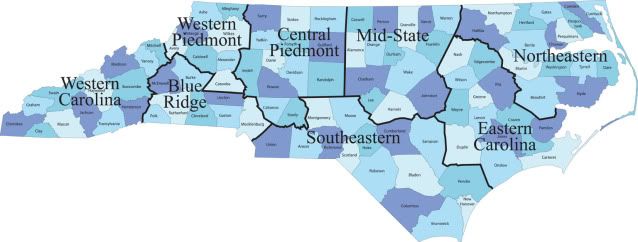
Please... don't forget to support your
Regional Safety Councils by joining
their membership ranks and participating
in their scheduled events. For
membership applications, see the Quick
Links to the right.
|
NCIC Video Library
Due to recent budget requirements,
we will discontinue our video
library on December 1, 2009.
At this time, we are not sure if
this will be permanent or short
term. Once a decision has been made,
we will inform you.
We apologize for any inconvenience.
|
A couple of weeks ago a
friend told me that someone
she knew had
their car broken into while
they were at a football
game. Their car was
parked on the green which
was adjacent to the football
stadium and
specially allotted to
football fans. Things stolen
from the car included
a garage door remote
control, some money and a
GPS which had been
prominently mounted on the
dashboard.
When the victims got home,
they found that their house
had been
ransacked and just about
everything worth anything
had been stolen.
The thieves had used the GPS
to guide them to the house.
Theythen
used the garage remote
control to open the garage
door and gain
entry to the house. The
thieves knew the owners were
at the football
game, they knew what time
the game was scheduled to
finish and so
they knew how much time they
had to clean out the house.
It would
appear that they had brought
a truck to empty the house
of its contents.
Something to consider if you
have a GPS - don't put your
home
address in it. Put a nearby
address (like a store or gas
station) so you
can still find your way home
if you need to, but no one
else would know
where you live if your GPS
were stolen.
MOBILE PHONES
I never
thought of this.......
This lady has now changed
her habit of how she lists
her names on
her mobile phone after her
handbag was stolen. Her
handbag, which
contained her cell phone,
credit card, wallet...
Etc...was stolen.
20 minutes
later when she called her
hubby, from a pay phone
telling
him what had happened, hubby
says 'I received your
text asking
about our Pin number and
I've replied a little while
ago.'
When they rushed down to the
bank, the bank staff told
them all the
money was already withdrawn.
The thief had actually
used the stolen
cell phone to text 'hubby'
in the contact list and got
hold of the pin
number. Within 20 minutes he
had withdrawn all the money
from their
bank account.
Moral of the lesson:
Do
not disclose the
relationship between you and
the people in
your contact list.
Avoid using names like Home,
Honey, Hubby, Sweetheart,
Dad,
Mom, etc....
And very importantly, when
sensitive info is being
asked through texts,
CONFIRM by calling back.
Also, when you're being text
by
friends or family to meet
them
somewhere, be sure to call
back to confirm that the
message came
from them.
If you don't reach them, be
very careful about going
places
to meet 'family and friends'
who text you.
|
|
What "Vow" Do You
Take?
 By
Michael Nance By
Michael Nance
I decided to review some of
the past articles that I've written over the
past few years to accomplish two things;
first, not to duplicate too much and second,
to see if I could write any updates. I
apologize for the length upfront.
The most recent would be the volunteer
issue. I became involved with Habitat for
Humanity just last month; though I have
heard about it for years and thought I
didn't have time to help. I had this
preconceived notion that it would be someone
over my shoulder as I worked and that I
would be working with folks having "no
clue". I know, I know, I was wrong and I
apologize publicly to those folks. I was
amazed that 30 to 35 people could come from
various skill levels and backgrounds to
literally "raise the roof" in one day.
Well, almost one day. 2 more volunteers and
it could have been one day. Two ladies in
particular were there to simply pick up
trash as it generated and to offer a water
or Gatorade to everyone else. Not a hard
thing to do, but it was very much needed and
appreciated. (It's hot completing the
truss/attic framing)
Others were there to cut lumber, plywood,
insulation, etc. to the proper requested
size as needed. Basically in one area there
were 4 workers: one to measure and document
the "parts" needed then go order them from
the folks doing "supply". That same person
delivered the parts to one or two installers
to complete the job while going to measure
for the next order. It was actually fun.
Sort of like a controlled, organized
emergency action team. Let me back up just a
bit. Before the start of each Saturday's
work plan, we gathered around and had a
brief devotion. The future owner's were
introduced to anyone new to the site, and a
little bit of paperwork is done. Name tags
were written and stuck onto shirts. That
didn't last long and it didn't matter. By
lunchtime, everyone knew everyone's name.
Once the devotions and preliminaries were
over, the head honcho gave a safety
briefing. I was impressed. In part he said
"we are here for a good cause, but you have
to keep safety first. Not everyone here is
aware of particular hazards. Please watch
others while you work below or above. Be
focused and careful.". Then we split off
having one experienced "manager" with each
group. The worst injury I was aware of was
sweat getting into my eyes.
The article I wrote for the June/July
edition simply caused me to think, "I need a
nap". The Saturday when I began this
article was a cooler rainy day. Nice nap
weather. Though I didn't have warm cookies,
I did bake a cake. Yes, I bake and I like
doing it and I clean up after myself. A
feat all on it's own. It was baked
perfectly and there was no accidental burns
removing it from the oven. I didn't cut
myself on the inner foil lining of the icing
can like I've done before, kinda
embarrassing. I correctly kept housekeeping
in order. I guess if I did anything wrong,
it was to sample it with a rather larger
piece than normal. So shoot me, I have a
smile on my face.
I reminded myself about the painful injury I
wrote in the January article. It's almost
been a year since I almost removed the end
of my finger in a woodworking incident.
It's grown back but it does have a somewhat
flat spot and it's still shiny. If I were
fingerprinted, it wouldn't show much on that
finger. I still have sensitivity issues on
the tip of the finger. It just further
proves how long an injury can affect you.
However, I can still cut a piece of cake.
(As I wipe chocolate icing from the computer
keyboard)
After the review of the January 09 article,
I thought I'd go back and see what first
article I wrote was about. I clicked on the
wrong month, but scanned it anyway and lo
and behold, I read an article by Dennis
Parnell, our fearless leader. His article
was on "Blackberry Thumb". Now, I am going
out on a limb here so back me up. I
recently was a part of a great Safety
Council workshop in Lenoir. Dennis was
there using his somewhat new blackberry. In
fact, during our last staff meeting, many of
us commented on his seemingly short, curt
replies on email. (We speak freely at the
staff meetings and only the occasional donut
is thrown, then quickly retrieved and
promptly eaten.) Anyway, Dennis told us he
was just being short and sweet, meaning no
negative tone. He said he is using his
blackberry sometimes when replying to us.
He was warned about the risk of carpel
tunnel and nodded his head, then asking
someone to pass the donut box. Seriously, a
local student in Gaston county was killed
several weeks ago because she was texting
and driving at the same time. If I am not
mistaken, the police found her phone, still
"on" with an incomplete text to her mom.
It's a very painful lesson to all that knew
or read about the accident. I hope it at
least convinces others that defensive
driving is real and I encourage all, both
teens and adults to contact our section for
class details.
As I clicked further into the 2007 archives,
I briefly read the "Bird Flu" article. I
had to laugh because that very issue was
brought back up just a day or two ago.
While giving a hazard recognition program,
Dennis retold the story of my incident with
Sabrina. (To my wife; no it's not a woman,
it's a bird) Long story short. We were all
doing a 30-hour APCAP and in the hotel lobby
was a bird with a rather large warning sign
that said "I love people but I can bite".
As I got closer to this bird, which by the
way was on the outside of the cage perched,
it stuck it's claw out as if saying, "come
over, I want to be friends". I did, it did
and the next thing I know it's on my arm. A
large cockatoo bird. I struggled with what
to do and before it was over, I had been
pierced just between my thumb and finger by
it's ever so large beak. All of this
happening while a co-worker (instead of
helping) decided to get some "good safety
pictures". I don't think I'll ever live
that one down. Some of you were there and
know. I should have had proper PPE
(gloves). Actually, I should have not
crossed that "yellow line". Just like the
yellow line many of you folks have around
machinery to warn others "keep out". Ignore
it and sooner or later, clamp! The bird will
bite.
Okay, I know I've gone long here but I
finally located the first article I wrote
for the NCIC. It's was March 2007. After
re-reading it, I encourage everyone to also
re-read it. Go to the SAFETY SECTION web
page by clicking
HERE . You might have to scroll down a
bit, but find March 2007 and there you are.
With a slight change, I could repeat that
same message for our current situation. Two
things have changed and probably more
changes are in the cards. First, note the
web address change for the NCIC. Second, as
you know by now, we are no longer "free".
(As of December 1st)
From that March 2007 article: "The North
Carolina Industrial Commission's Safety
Section is a group of experienced folks that
want to act in a preventative measure with
your existing safety program. We have a
broad range of topics with a special
interest in getting participants involved
and getting everyone focused on having a
safe work and home environment. We offer
practical instruction on prevention, which,
in turn can reduce worker's compensation."
So when you review the fee schedule, think
of how much the last worker compensation
claim cost your company. Most claims easily
cost more than $1,500. If our accident
prevention program helps you prevent just
one claim in a twelve month period, you've
saved money. In addition, you've save
indirect cost as well, such as time lost,
replacement worker expense, time to handle
and process the claim, and more.
If you are on the bubble about the Safety
Section's services, please give your local
representative or Dennis Parnell a call or
email. For our current customer base: I
hope you will continue to use our services
in some form or manner. We will be
announcing workshops scattered across the
state to help the smaller employers get the
proper training they need and satisfying the
regulations. I hope the changes in our
safety section will continue to yield proven
results reducing worker's comp expense and
reducing injury's. As an example of our low
fees, we've checked, the average fee for a
First Aid/CPR/AED class is $50. We are
offering it for $35 and that includes the
materials/workbook. Wow! What a deal!
To leave you with one more thought that I
echo in many of my sessions from an
emergency response class: "We take a vow to
protect life and property, life comes
first." As the economy struggles to
recover, let's not put safety on the "back
burner". If you do, the front burner might
just cost you a whole lot more as you reach
across.
Editor's note: Michael Nance is the NCIC
Blue Ridge, Southern & Western Piedmont
areas Safety Representative. If you are
interested in having one of our programs
in your area, please give Michael a call
at 919-218-9047 or email him at
Michael.Nance@ic.nc.gov
|
Bad Safety Habits
The word safety refers to
your freedom from danger, injury and damage,
and to your personal security. It's what
America was founded on. It's what everyone
wants, but doesn't always get. It requires
a lot of effort to have and to keep.
In recent years there has
been a concentrated effort in our country to
reduce accidents and save lives -- in the
process, the word safety has been used so
often that many of you may think of it as a
"Preaching Word", or a word that forces you
to alter your ways or change bad habits.
Instead, when you hear the
word safety, think of it as a word that
applies to the way you do everything in
life. If you have bad safety habits, you're
just not doing things as well as you
should!
For example: If your
driving safely, you're simply operating your
vehicle as intended and obeying the laws, no
more, no less. If your working with a power
tool that requires eye protection, don't
fight it. Safety glasses are simply a
necessary accessory to the proper use of
that tool. If you're at home, take the time
to use a ladder instead of standing on a
chair that was made to sit on.
Today is the
best time to think about your bad safety
habits and then correct them. Improving
your bad safety habits will require
concentration and effort, but the results
will help make you a more responsible and
desirable employee, improved driver, and a
good example to those around you -- and your
bonus for this effort is - a greatly reduced
chance of becoming an accident statistic
this year.
Now you know. Dennis :)
|
Insight!?
Fun and useless tidbits

In 1903 the Wright
Brothers made the first successful
powered flight by man at Kill Devil Hill
near Kitty Hawk. The Wright Memorial at
Kitty Hawks now commemorates their
achievement.
High Point is known
as the Furniture Capital of the
World.
Because steel expands
when it gets hot, the Eiffel Tower
is six inches taller in the summer
than in the winter.
Someone paid $14,000
for the bra Marilyn Monroe wore in
Some Like It Hot.
Most elephants weigh
less than the tongue of the blue
whale.
|
What Am I? Safety
Quiz
How well do you know the history of the equipment
we use everyday?
Try and guess what
is being described in each group based on
the hints given.
What Am I?
1)
I WAS PAENTED IN 1919.
2)
I WAS ORIGINALY MADE OF STEAMED
CANVAS, GLUE AND BLACK PAINT.
3)
I WAS FIRST MADE OF ALUMINUM IN 1938.
4)
THE FIRST PLACE DESIGNATED FOR ME TO
BE USED WAS THE GOLDEN GATE BRIDGE.
What Am I?
1)
I WAS PATENTED IN 1880.
2)
MY FIRST WIDE SCALE PRATICAL
APPLICATION WAS DURING WWI IN GAS MASKS.
3)
IN THE 1940'S COMPANIES WERE FORMED
TO PRODUCE ME FOR USE BY WELDERS, CHIPPERS,
TOOL GRINDING, AND METAL SHAPING.
4)
MY MARK IS Z87.
What Am I?
1)
I WAS DEVELOPED IN THE EARLY PART OF
THE 20TH CENTURY ORIGINALY USED
BY UTILITY LINESMEN.
2)
I WAS ORIGINALLY MADE FROM COTTON AND
LEATHER.
3)
MY ANCESTOR WAS A BELT.
4)
MODERN TYPE IS BASED ON ONE USED IN
THE MILLITARY BY PARATROOPERS.
Answers at end of Safety
Bulletin.
|
|
Accident
Costs
Workers comp insurance only pays Direct
costs, which include medical bills, a
percentage of lost wages, maybe some
travel expenses and prescription
cost's. It does not cover the indirect
costs. Some examples are: Production
suffers, people want to see what
happened, want to help. There may be a
need to clean up after an accident, this
could shut an area of the building down
temporally. Lost worker, this one can
get tricky. Could the need to train a
new person, hire a temp or steal someone
from another department be a factor?
Quality suffers, customer relations
suffer, and sales have to work harder.
See where we are going? This could go
on and on.
Indirect costs are equal
to three to fives times the cost of the
original accident! Last year Our Company
shelled out over $423,423.00 in workers
comp cost's. This is not what the
insurance paid, this is what we the
company paid. Lets split the difference
and go with four times that, $1,693,692
that is our indirect cost. Add that to
the medical, $2,117,115.00. Large
amount of money spent for something so
preventable.
Missing product: We had
over 3225 packages missing with a price
tag of $ 159,633.00. Now much like the
workers comp example indirect costs are
at least three to fives times as much as
the direct cost. Re-picks, overtime
customer satisfaction, sales and special
trips to name a few. Special trips run
from $500 a day to over $1,300 per day!
And that's only mileage cost's for
company, those figures do not include
the compensation for the driver. You can
do the math. Just imagine what we could
be doing with that extra profit. All
the building projects that could be
completed. Imagine what type of salary
increases would be possible. Win
Share? It's in our best interest to
control these cost the best we can.
Safety and Quality go hand and hand,
from the moment you walk in the door
till the time you pull out of the
parking lot. We need everyone to be
onboard with us. We Can not depend on
one department, or one person from each
department. We need everyone's help to
make a difference. - Jay Rader
|
 Onions? Onions?
I have used an onion, which has been left in
the fridge, and sometimes I don't use a
whole one at one time, so save the other
half for later. Now with this info, I have
changed my mind! will buy smaller onions in
the future.
Written by Zola Gorgon - author of several
cookbooks.
Watch out for those spoiled onions.
I had the wonderful privilege of touring
Mullins Food Products, makers of mayonnaise.
Mullins is huge, and is owned by 11 brothers
and sisters in the Mullins family. My
friend, Jeanne, is the CEO.
Questions about food poisoning came up, and
I wanted to share what I learned from a
chemist. The guy who gave us our tour is
named Ed. He's one of the brothers. Ed is a
chemistry expert and is involved in
developing most of the sauce formula. He's
even developed sauce formula for McDonald
's.
Keep in mind that Ed is a food chemistry
whiz. During the tour, someone asked if we
really needed to worry about mayonnaise.
People are always worried that mayonnaise
will spoil. Ed's answer will surprise you.
Ed said that all commercially-made Mayo is
completely safe. "It doesn't even have to be
refrigerated. No harm in refrigerating it,
but it's not really necessary." He explained
that the pH in mayonnaise is set at a point
that bacteria could not survive in that
environment. He then talked about the
quaint-essential picnic, with the bowl of
potato salad sitting on the table and how
everyone blames the mayonnaise when someone
gets sick.
Ed says that when food poisoning is
reported, the first thing the officials look
for is when the 'victim' last ate ONIONS and
where those onions came from (in the potato
salad). Ed says it's not the mayonnaise (as
long as it's not homemade Mayo) that spoils
in the outdoors. It's probably the onions,
and if not the onions, it's the POTATOES. He
explained, **onions are a huge magnet for
bacteria, especially uncooked onions. You
should never plan to keep a portion of a
sliced onion. He says it's not even safe if
you put it in a zip- lock bag and put it in
your refrigerator. It's already contaminated
enough just by being cut open and out for a
bit, that it can be a danger to you (and
doubly watch out for those onions you put in
your Hotdogs at the baseball park!).
Ed says if you take the leftover onion and
cook it like crazy you'll probably be okay,
but if you slice that leftover onion and put
on your sandwich, you're asking for trouble.
Both the onions and the moist potato in a
potato salad, will attract and grow bacteria
faster than any commercial mayonnaise will
even begin to break down.
So, how's that for news? Take it for what
you will. I (the author) am going to be very
careful about my onions from now on. For
some reason, I see a lot of credibility
coming from a chemist and a company, that
produces millions of pounds of mayonnaise
every year.'
Also, dogs should never eat onions. Their
stomachs cannot metabolize onions.
**Note: According to Snopes.com, "Cut bulb
onions are a magnet for bacteria is
UNDETERMINED."
|
Western Piedmont Safety Council
Recent Workshop
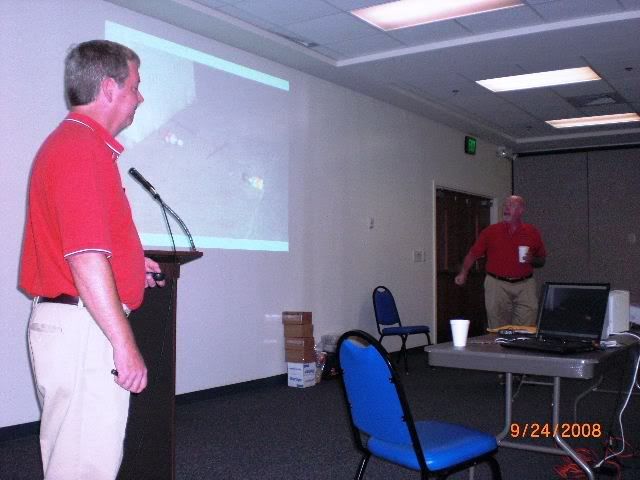
Michael
Nance and Dennis Parnell discuss
Hazard Recognition at a recent Western
Piedmont Safety Council Workshop in
Lenoir.
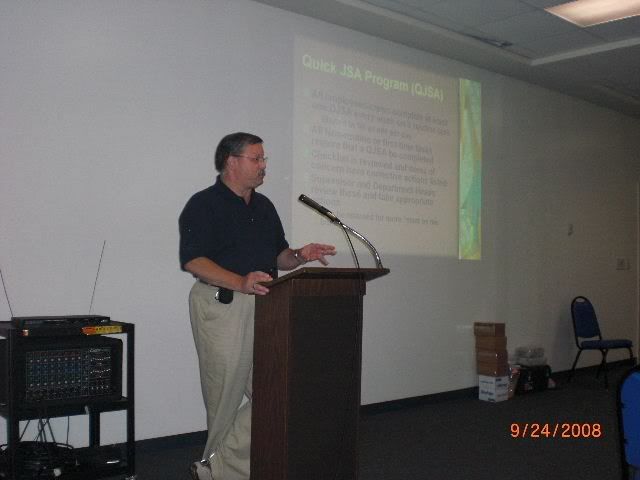
Rick
Collier with LP Corporation gives
a presentation on Job Safety Analysis at
the Western Piedmont Safety Council Fall
Workshop. Please support our Regional
Safety Councils.
Join your Regional Council Today!
|

Hazard Alert!
Office safety do's and don'ts
Do:
-
Keep aisles and
walkways free of tripping
hazards.
-
Position office
furniture and cabinets away from
doors and aisles to allow people
to move around freely and
safely.
-
Use a stepstool
or ladder to reach high shelves.
-
Keep desk and
file drawers closed when not in
use.
-
Place the
heaviest items on the lowest
shelves of bookcases and in the
bottom drawers of file cabinets.
-
Keep the area
around your desk neat and
orderly.
-
Maintain good
posture to avoid stressing neck,
shoulders, back, and wrists.
-
Be careful when
closing drawers so that you
don't pinch fingers.
-
Make sure staples
are completely closed to avoid
cuts.
-
Turn on the light
before entering a dark room or
space.
-
Report any safety
hazards to your supervisor.
Don't:
-
Don't overload
electrical circuits.
-
Don't use
extension cords as a permanent
solution.
-
Don't block exit
routes or emergency doors.
-
Don't try to lift
items that are too heavy for
you-get help or call
maintenance.
-
Don't forget to
wear appropriate PPE, such as
safety glasses, hearing
protection, or a hard hat, if
you need to go into
manufacturing areas of the
facility.
-
Don't repair
office equipment; leave it to
trained and authorized
personnel.
|
What Folks Are Saying...
Michael,
I just had to let
you know that I read your
September Article in the N.C.
Industrial Commission Safety
Bulletin, called My Laptop Bit
Me!
It was great and I had a good
chuckle. Awesome reminder, I
have lost my files in the past
and I still forget to back them
up.
Thanks Again,
Vicki Burdge
Cardinal Logistics Management
Corporation
Customer Support Center-Safety
Dept.
|
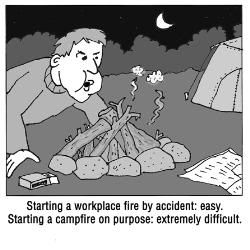 Be
Fire Smart Be
Fire Smart
Take steps to prevent workplace
fires
What does it take to
start a workplace fire? Surprisingly
little. First, you need some oxygen,
and there's no shortage of that in
the air. Then you need some kind of
fuel, and there's a lot of that in
the form of paper, cardboard, wood,
cloth, flammable and combustible
liquids, and other materials that
burn easily. Finally, you need an
ignition source like a spark, a
flame, heat, or electricity. Oh,
yes, there's one other
thing-carelessness. Somebody has to
be careless enough to let all these
fire-starters get together.
Here's an
example:
A leaking
chemical container releases
flammable vapors that are
heavier than air, and so they
sink to floor level and travel
across the work area to where a
worker is using a metal tool
that creates a spark. The spark
ignites the vapors, which burn
rapidly. If there are enough
vapors or if the fire makes it
back to the container of
flammable liquid, there could be
an explosion.
All the elements of a
fire existed here-oxygen, fuel, and
ignition source-plus the added
ingredient, carelessness. The worker
should have been using nonsparking
tools in an area where flammable
liquids were present. And someone
should have inspected the container,
found the leak, and reported it.
Here's another
example:
There's a pile
of cardboard and paper trash out
on the loading dock. A worker
sneaking a smoke fails to
completely extinguish the
cigarette before tossing the
butt into the pile of trash. It
takes a while, but eventually
the trash bursts into flames. If
the fire goes unnoticed for
long, it could easily spread.
Again, all the
elements for starting a fire were
there. Plus, someone's carelessness
resulted in a pile of combustible
trash lying around, and someone
else's carelessness set the trash on
fire.
Look around your work
area. Is there fuel to start a fire?
Are there ignition sources? Are you
being careful and making sure that
the fuel and the ignition sources
don't get together to start a fire?
|
|
Western Carolina Safety Council Fall
Workshop
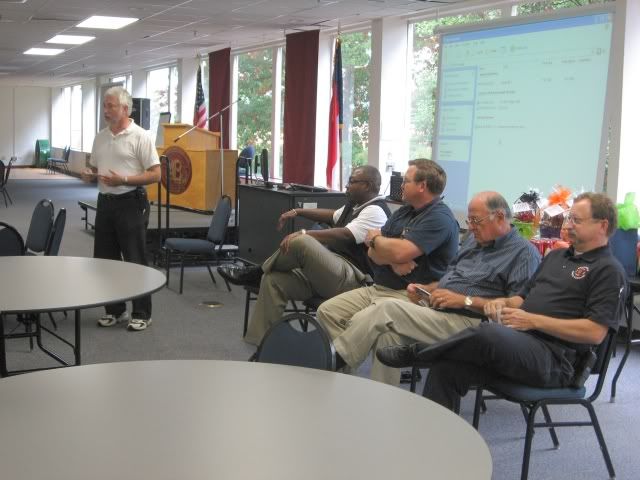 Andy
Spradley, WCSC Treasurer, leads the
Speakers' Panel at a recent Fall Workshop.
Attendance and Lunch was great! If you
missed this one, be sure you make the next
Western Carolina Safety Council event. Andy
Spradley, WCSC Treasurer, leads the
Speakers' Panel at a recent Fall Workshop.
Attendance and Lunch was great! If you
missed this one, be sure you make the next
Western Carolina Safety Council event.
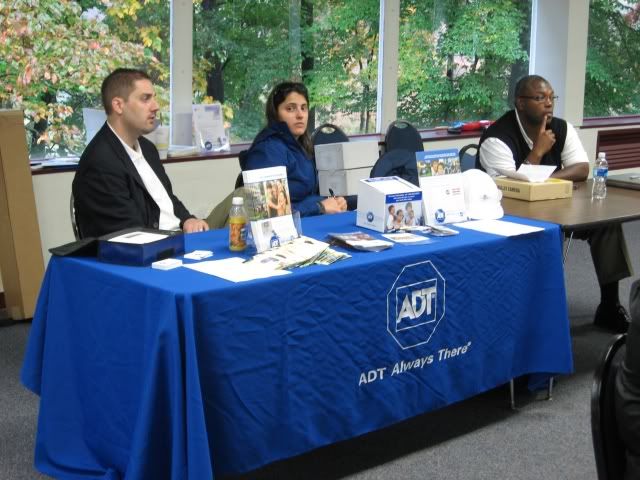 And Vendors too!
And Vendors too!
ADT was well
represented as attendees were able to
network and learn the many services they
offer.
|
|
Answers:
1)HARD HATS, 2)SAFETY GLASSES, 3)SAFETY
4)HARNESS
Thanks to D. Robertson.
|
|
About N.C. Industrial Commission
Safety Section
The N.C. Industrial
Commission Safety Education Section stands
ready to assist you with your Safety
training needs. We offer a variety of
courses, designed to suit your needs. Please
give one of our Industrial Safety
Representatives a call.
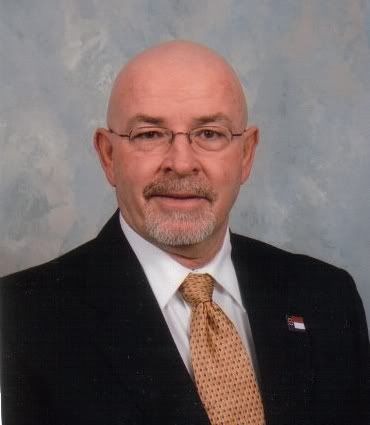 DENNIS
PARNELL DENNIS
PARNELL
Director Safety Education
919-218-3000-Cell
919-807-2602
Dennis.Parnell@ic.nc.gov
 KIM
NADEAU
Program Assistant
919-807-2603
919-218-9049-Cell
Kim.Nadeau@ic.nc.gov
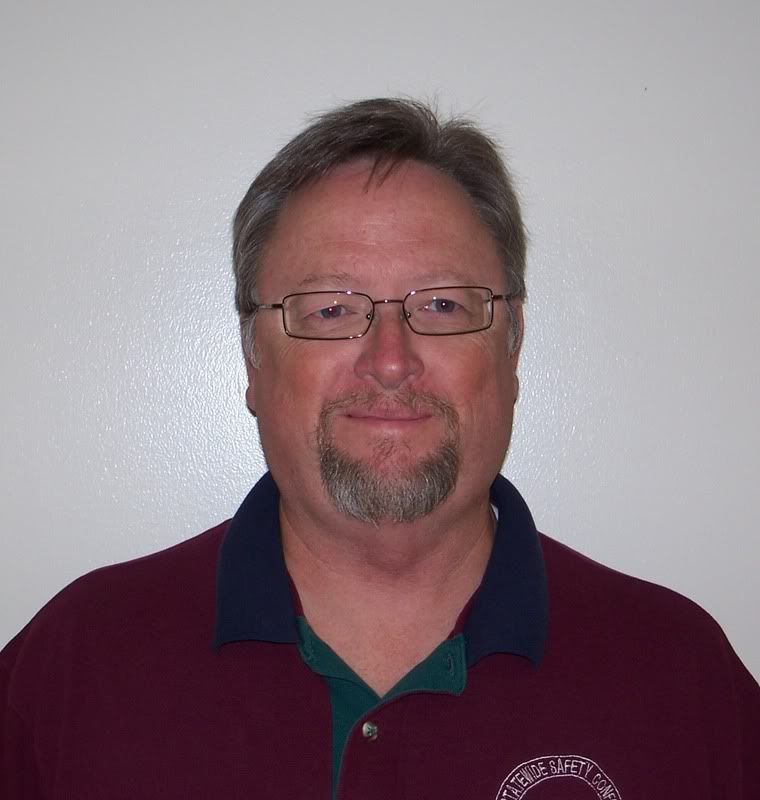 RANDY
CRANFILL RANDY
CRANFILL
Western Carolina Area & APCAP & APW
Coordinator
919-218-2986
Randy.Cranfill@ic.nc.gov
 ALVIN
SCOTT ALVIN
SCOTT
Eastern & Northeastern Areas, Eastern
Defensive Driving Instructor
919-218-2792
Alvin.Scott@ic.nc.gov
WE ARE
STILL WORKING FOR YOU!
|
|
|
|
Quick Links
VIDEO
Gas Truck
Explosion
This gas truck explodes after a static
electricity discharge from a balloon.
PLAY VIDEO...
|
|
Quick Links
General
Industry
|
|
Quick Links
Fleet Safety
Prevent Vehicle Fires
|
|
Quick Links
CENTRAL
PIEDMONT SAFETY COUNCIL
Membership
Brochure
|
|
Quick Links
EASTERN
CAROLINA SAFETY COUNCIL
Membership
Brochure
|
|
Quick Links
SOUTHEASTERN SAFETY COUNCIL
Membership
Brochure
|
|
Quick Links
WESTERN
PIEDMONT SAFETY COUNCIL
Membership
Brochure
|
|
Quick Links
MID-STATE
SAFETY COUNCIL
Membership
Brochure
|
|
Quick Links
BLUE RIDGE SAFETY COUNCIL
Membership Brochure
|
|
Quick Links
NORTHEASTERN SAFETY COUNCIL
Membership Brochure
|
|
Quick Links
WESTERN
CAROLINA SAFETY COUNCIL
Membership Brochure
|
|
Quick Links
NC RURAL WATER ASSOCIATION
|
|
Quick Links
SIGN-UP FOR OUR NCIC SAFETY
BULLETIN
Email/Newsletter
|
|
Quick Links
news & notes
SAFETY CHECKS
The last day
of October is the last day of
daylight saving time. The University of
Oklahoma Police Department suggests using
the occasion of setting your clocks forward
or back as a cue to:
Check and
replace the batteries in your smoke and
carbon monoxide (CO) alarms. Also
replace smoke alarms older than 10 years.
Replace CO alarms older than 5 years.
Check your disaster supply kit, e.g., water,
food, flashlights, batteries, and blankets.
Use the time change to check its contents,
including testing/replacing flashlight and
radio batteries.
Check storage areas for hazardous materials.
Discard any that are outdated, no longer
used, or in poor condition.
Go through your medicine cabinet.
Discard outdated medications. Crush them and
dis-card them in a way that children can't
find them.
And help is just a phone call
away.Call your
NCIC AREA
SAFETY CONSULTANT!
|
|
Quick Links
DRUG-FREE WORK
WEEK
The week of
October 19 to 25 is Drug-Free Work Week.
This is a good time to remember how hazardous it
is to drive or work under the influence of drugs
or alcohol. The purpose of this event is to
highlight the dangers of substance abuse and
encourage working people with drug or alcohol
problems to seek help.
Give us a call...
|
MAKE HALLOWEEN
SAFE THIS YEAR
Are your kids
already planning their cos- tumes and mapping
the most productive trick-or-treat routes?
Though Halloween is one of the most popular
holidays, it is also one of the most risky.
Here's how to
protect your kids:
-
Do
teach them to stay away from candles.
-
Do
make sure your witch or goblin carries a
flashlight and wears reflective
clothing.
-
Don't
let them wear long costumes that can
trip them.
-
Don't
buy costumes with masks. They can
obstruct vision. Use makeup instead.
-
Don't
let children trick or treat
alone. Accompany the younger ones
yourself, and make sure older kids are
part of a group.
|
|
Quick Links
THE UNASKED
QUESTION CASE
When a company came up with a new
formula for its products, the employee in charge of
weighing ingredients was retrained to make new
measurements. He didn't fully understand the changes
but was too embarrassed to ask how to recalibrate
the scales again.
After a few days of poor production runs, the
problem was tracked down to this employee and the
question he didn't ask.
|
|